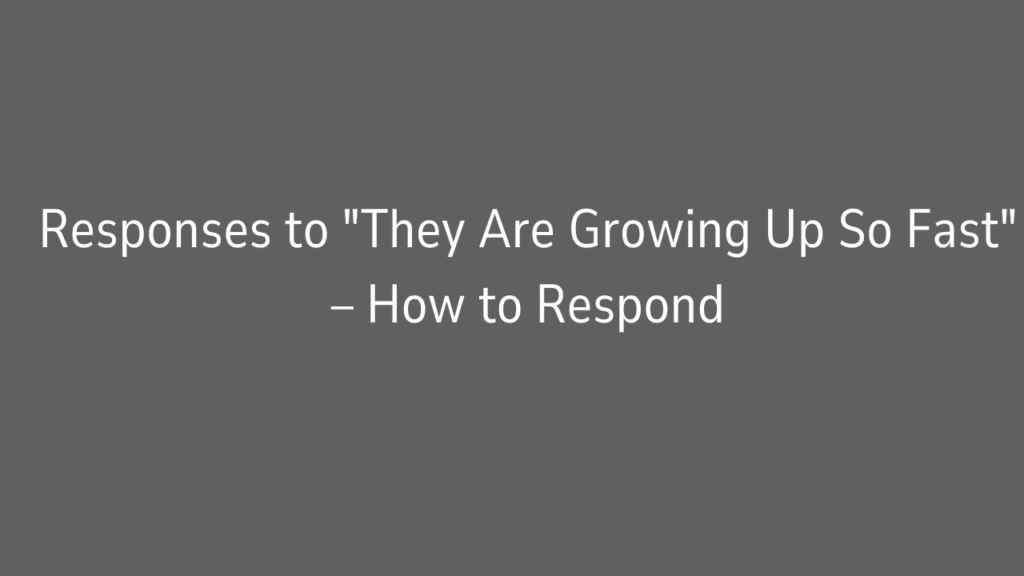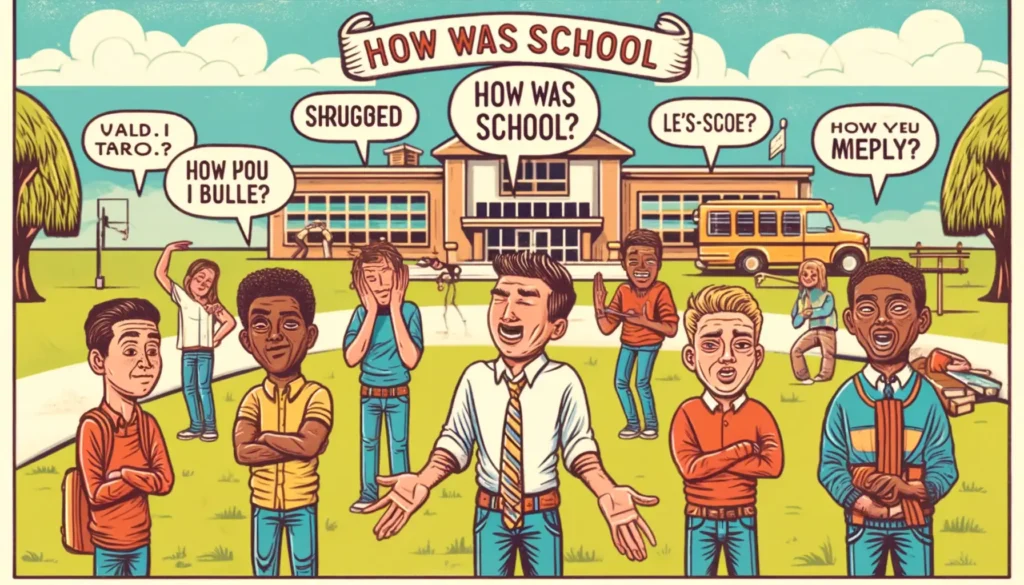As children grow, so do the emotions and reflections of those around them. Whether it’s a parent, grandparent, friend, or relative, it’s not uncommon to hear the phrase, “They are growing up so fast.” This statement is often a mix of nostalgia, awe, and sometimes even a touch of sadness as one reflects on how quickly time passes. It’s a phrase that speaks to the bittersweet feeling of watching children change and mature, often faster than we expect.
If you’ve ever found yourself on the receiving end of this comment, you might be wondering how to respond. Whether you’re the parent, grandparent, relative, or friend, knowing how to respond thoughtfully is important. In this post, we’ll explore various responses to “They are growing up so fast” — ranging from sentimental and reflective to humorous and lighthearted. You’ll find the right tone and words for every occasion.
Let’s dive into the best responses and how to navigate these types of comments with grace and understanding.
Understanding the Emotion Behind the Statement
Before jumping into the different ways to respond to “They are growing up so fast,” it’s important to first understand why people say this. The remark is often layered with a mixture of emotions:
- Nostalgia: The person making the comment may be reflecting on the child’s earlier, younger days. Watching children grow can stir up feelings of nostalgia for simpler times when the child was smaller or needed more care.
- Admiration: Often, this phrase comes from a place of admiration. The individual might be amazed at how much the child has accomplished or how their personality has evolved over time.
- Sadness or Regret: For some, it’s a little sad to see time fly by so quickly. They might feel that they missed out on some of the moments, or they’re just feeling the emotional weight of change.
- Excitement: There’s also an element of excitement in watching children grow. It’s wonderful to see them reach milestones and develop new skills, which is why the comment can sometimes be filled with optimism and joy.
Recognizing these emotions will help you understand how to approach your response to the statement with empathy and care. It’s about knowing the tone and offering a suitable reply.
How to Respond to “They Are Growing Up So Fast”
Here are several different ways you can respond to “They are growing up so fast,” depending on the situation and your relationship with the person making the comment.
1. Sentimental Responses
If you want to share in the sentiment of the comment and reflect on the bittersweet nature of time passing, these responses can help express how much you appreciate watching the child grow.
Examples of Sentimental Responses:
- “It feels like just yesterday they were in diapers, and now look at them!”
- A nostalgic response that acknowledges how much the child has grown, evoking a sense of both awe and sentimentality.
- “I know, it seems like every time I turn around, they’re doing something new!”
- A relatable response that communicates how quickly kids develop and highlights the joy of watching them learn and grow.
- “They really are growing up so fast, and it’s amazing to see them become such a strong, smart person!”
- A response that highlights how the child’s growth is not only physical but also emotional and intellectual.
- “It’s both amazing and a little bittersweet, isn’t it? Time really does fly.”
- This response shows that you share the feeling of time passing quickly and can resonate with the emotional weight behind the comment.
- “It’s hard to believe how far they’ve come already, but I’m so proud of them!”
- A response that balances the wistful feeling with a positive note about the child’s accomplishments.
Why It Works:
- Acknowledges the emotion: These responses show that you understand the person’s sentiment and are reflecting on the child’s growth alongside them.
- Shares your experience: They allow you to share in the shared wonder of watching a child grow.
- Provides emotional depth: Sentimental responses convey depth and can lead to meaningful conversations about memories and the passage of time.
2. Humorous Responses
Sometimes, injecting a bit of humor into the conversation can lighten the mood and ease any sadness or over-reflection that comes with this statement. Humor also adds a fun twist to an otherwise serious topic.
Examples of Humorous Responses:
- “Well, they have to grow up eventually, but I wish they’d slow down long enough to let me catch my breath!”
- A playful response that makes light of the rapid pace of growth and the challenge of keeping up with it.
- “They’re growing so fast, I’m going to need a ladder to keep up with them!”
- A lighthearted way of acknowledging the child’s growth, using humor to reflect on how quickly they’ve become taller and more independent.
- “You should see how much food they eat now! It’s like they’re growing on an unlimited supply of snacks!”
- A funny observation about how children’s appetites grow with their bodies, making light of how much they change.
- “They’re growing so fast, I’m already preparing for their teenage years!”
- A humorous and somewhat dramatic response that jokes about the challenges of parenting as kids grow older.
- “Next thing you know, they’ll be asking for the car keys!”
- A playful response about how quickly children develop independence, especially as they approach driving age.
Why It Works:
- Lifts the mood: Humor helps break any tension or sadness that might accompany discussions about growing up.
- Relatable: Many parents and caregivers can relate to the funny aspects of watching kids grow, making it an easy conversation to jump into.
- Engages others: Humor invites laughter and shared stories, which can enrich the conversation and build rapport.
3. Optimistic and Excited Responses
Sometimes, it’s best to focus on the exciting and positive aspects of a child’s growth. These responses show that you’re not just reflecting on time passing, but you’re looking forward to all the amazing things the child will achieve as they continue to grow.
Examples of Optimistic Responses:
- “Yes, they’re growing up so fast, and I can’t wait to see all the incredible things they’ll do next!”
- An enthusiastic response that focuses on the future and the possibilities ahead for the child.
- “It’s amazing to see them blossom into such a talented and capable person. I’m excited to see where they go!”
- A positive response that celebrates the child’s development and the bright future ahead of them.
- “It’s wonderful to see how much they’re learning and how much more they can do every day. The future looks bright!”
- This response highlights the child’s potential and encourages optimism about their growth and achievements.
- “I’m so proud of them and can’t wait to see what they do next. The best is yet to come!”
- An upbeat response that shows you are genuinely excited about the future and all that the child is capable of achieving.
- “Yes, it’s amazing! They’re growing into someone really special, and I’m excited to be a part of it!”
- A response that emphasizes the joy of watching a child develop into a unique individual.
Why It Works:
- Focuses on the positive: These responses highlight the excitement of growth rather than focusing on the sadness that time is passing.
- Inspires hope: It shows that growth isn’t just about physical change; it’s also about potential and possibility.
- Encourages forward thinking: Optimistic responses can shift the conversation to look forward to what’s yet to come, making the discussion feel more hopeful.
4. Reflective Responses
In some cases, a reflective response can lead to a more profound discussion about time, life, and change. This type of answer can help you engage in a deeper conversation about the meaning of growing up.
Examples of Reflective Responses:
- “It’s incredible how quickly they grow, and it reminds me how important it is to cherish every moment.”
- A thoughtful response that encourages appreciation for the present moment while acknowledging the fleeting nature of time.
- “I know, it’s hard to believe sometimes. Watching them grow is a beautiful reminder that life is always moving forward.”
- A reflective response that speaks to the philosophical side of growth and time passing.
- “Time really does fly when you’re watching someone grow. It makes me think about how much I’ve changed, too.”
- A response that invites deeper reflection, not just on the child’s growth, but on the growth of everyone involved.
- “It’s funny how fast they grow. I often find myself wishing I could freeze time just for a little while.”
- A sentimental reflection that emphasizes the desire to hold onto precious moments.
- “It’s amazing how quickly they grow. It makes you realize just how quickly life passes by, and how we should make the most of each day.”
- A more philosophical response that brings attention to the fleeting nature of life.
Why It Works:
- Promotes deep thinking: Reflective responses can open up more meaningful conversations about the passage of time, life changes, and personal growth.
- Encourages appreciation: These answers encourage others to think about the value of cherishing the moments they have.
- Fosters connection: Sharing personal reflections can deepen your connection with others who might be feeling the same way.
When to Choose Each Type of Response
Sentimental Responses:
- Best used when you want to share in the person’s feeling of nostalgia or when you’re feeling emotional about the child’s growth.
Humorous Responses:
- Ideal for lightening the mood and bringing a sense of humor to the conversation. These are great when the atmosphere is a little heavy or when you want to make others laugh.
Optimistic Responses:
- Great for emphasizing the positive aspects of growth and focusing on the future. These responses are perfect when you want to uplift the conversation and keep things hopeful.
Reflective Responses:
- Best for deepening the conversation and encouraging thoughtful reflection. These responses are suitable when you want to connect on a deeper emotional level.
Conclusion
The statement “They are growing up so fast” is one that resonates deeply with parents, grandparents, relatives, and even close friends. It reflects the awe and sometimes bittersweet nature of watching a child grow, but it’s also an opportunity to share in the excitement, humor, and reflection that comes with watching a young person mature. Whether you choose to respond with sentiment, humor, optimism, or reflection, your answer can deepen connections and spark meaningful conversations.
The key is to choose a response that aligns with your feelings, the mood of the conversation, and the person you’re speaking to. No matter which type of response you choose, it’s a beautiful reminder of how much we grow, change, and evolve.



